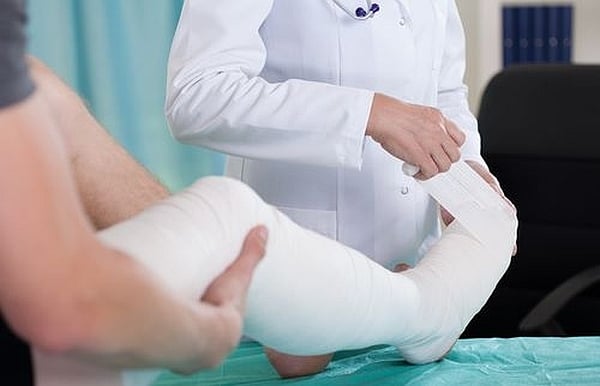- Chiropractic
Most people involved in a car accident know they’re injured right away. They can see that they’re bleeding, or they feel the pain associated with a broken arm. However, nerve damage can take longer to manifest. Once it does, you may be wondering if an Athens chiropractor can help with your nerve damage and related symptoms.
Chiropractic treatment is an effective approach for addressing injuries sustained in auto accidents. Common issues include nerve damage, pinched nerves, and nerve pain, often resulting from whiplash, spinal cord injuries, and back or neck trauma. These conditions can affect the nervous system, leading to intense nerve pain symptoms, muscle weakness, and neuropathic pain.
How Can a Car Accident Cause Nerve Damage?
Many people don’t think about nerve damage when they think about car accident injuries. They tend to think of broken bones, internal injuries, and back injuries. The truth is that a lot of these injuries can lead to nerve damage.
Here are some of the more common ways in which a car accident can cause nerve damage:
Whiplash
Whiplash is a neck injury that happens when your head is violently thrown back and forth during a crash. In addition to soreness and stiffness, whiplash can also cause a pinched nerve. This is an injury that is commonly treated by a chiropractor using spinal manipulation. They will massage and stretch your neck until the pinched nerve works itself loose.
Arm and Shoulder Injuries
Many injuries to the arms and shoulder area involve nerve damage. When any part of your body is inflamed or crushed, you’re liable to suffer a pinched nerve. Your chiropractor can do a series of chiropractic adjustments and manipulations to help relieve the pain and burning sensations associated with nerve damage.
Back Injuries
Many back injuries, especially herniated discs, can lead to nerve damage. Such injuries often compress the spinal cord or spinal nerve roots, resulting in nerve pain. Many back injuries can be treated effectively by an Athens chiropractor using chiropractic adjustments and transcutaneous electrical nerve stimulation to relieve nerve pain and treat the underlying causes.
Neck Injuries
Most people aren’t surprised to learn that neck injuries can involve nerve damage. Depending on how your neck is exposed during the accident, there’s a good chance that you may suffer a pinched nerve or another type of nerve damage affecting the central nervous system.
We suggest that you come into our Athens treatment center and let us run diagnostic tests. Our team can then craft a personalized treatment plan that will address both your nerve damage and the underlying injuries, focusing on chiropractic care and proper alignment of the spine to relieve pain.
What Are the Most Common Symptoms of Nerve Damage?
It usually doesn’t take long for an accident victim to realize they have nerve damage. The pain associated with this kind of injury is tremendous. Not only is it intense, but the pain also never lets up.
Many of the people who come to our Athens treatment center complain about their nerve pain. Some don’t even know where it’s coming from. They just know that they need relief, and they need it quickly.
Some of the more common symptoms that accompany nerve damage include the following:
- Tingling in the extremities
- Numbing in the fingers or toes
- Intense pain, especially in the affected area
- Inflammation and tenderness
- Burning
If you feel any of these following symptoms, there’s a good chance you have a pinched nerve. You could have some other type of nerve damage as well. For example, any damage to your sciatic nerve can cause a tremendous, burning pain down the entire length of your leg. Such symptoms often indicate issues with sensory nerves and motor nerves.
Treating pinched nerves is essential for alleviating the discomfort and pain caused by this common condition. Pinched nerves occur when too much pressure is applied to a nerve by surrounding tissues, such as bones, cartilage, muscles, or tendons.
How Does a Chiropractor Treat Your Nerve Pain?
You may wonder how an Athens chiropractor can help someone with nerve damage. Chiropractors specialize in adjusting the human body to help relieve pain and tightness. This chiropractic care focuses on the musculoskeletal system and its proper functioning.
Oftentimes, nerve pain happens because an inflamed muscle is pressing on the nerve. Your chiropractor will manipulate your body to help move the muscle away from the irritated nerve. They can then offer massage or even electrical stimulation to offer immediate pain relief. Treatments like cold laser therapy and spinal decompression may also be used to treat pinched nerves.
At some point, the nerve will become irritated again. This is why the experts at our Athens treatment center suggest continued therapy to allow you to gradually recover from whatever underlying injury you suffered in your car accident.
A personalized treatment plan, including physical therapy and regular chiropractic adjustments, can help treat pinched nerves, muscle spasms, and other related issues. By addressing the root cause of the pain and ensuring proper functioning of the musculoskeletal system, chiropractic treatments can significantly reduce pain and support the healing process.
Treatments Used by Chiropractors for Nerve Damage After a Car Accident
After a car accident, nerve damage can lead to intense pain and discomfort, requiring specialized care. Chiropractors employ various treatments to address nerve damage, treat nerve pain, and promote healing. Here are some of the most common methods used:
1. Chiropractic Adjustments
Chiropractic adjustments, or spinal manipulation, are core techniques used to treat nerve damage. These adjustments help realign the spine, reduce nerve interference, and alleviate pressure on the affected nerves. By restoring proper alignment, chiropractic adjustments can significantly reduce pain, improve nerve function, and the spine’s health.
2. Spinal Decompression
Spinal decompression therapy is used to relieve pressure on the spinal cord and nerves. This treatment involves gently stretching the spine, which can help alleviate pain caused by herniated discs or other spinal conditions. The process creates negative pressure within the discs, encouraging retraction of the herniated or bulging disc material and promoting the movement of oxygen, water, and nutrient-rich fluids into the discs, enhancing the healing environment.
Spinal decompression can be particularly effective for pinched nerve pain resulting from many pinched nerves. By reducing the compression on the nerves, it can alleviate the intense pain and discomfort often associated with these conditions. The gentle stretching also helps to increase the space between the vertebrae, which can reduce nerve irritation and improve overall nerve function.
Patients undergoing spinal decompression therapy often experience relief from neuropathy symptoms, such as tingling, numbness, and weakness, which are common indicators of nerve damage. This therapy can also aid in relieving muscle pain and spasms by reducing the strain on surrounding muscles and allowing them to relax.
In addition to providing immediate pain relief, spinal decompression therapy can contribute to long-term spinal health. Regular sessions can help maintain proper spinal alignment, prevent the recurrence of disc issues, and support overall spinal function. This non-invasive treatment is an integral part of a comprehensive chiropractic care plan aimed at addressing both the symptoms and underlying causes of spinal and nerve-related pain, promoting sustained recovery and improved quality of life.
Patients who seek treatment with spinal decompression therapy often find it beneficial in managing conditions such as sciatica, degenerative disc disease, and spinal stenosis. The therapy’s ability to address the root cause of the pain rather than merely masking symptoms makes it a preferred choice for those looking to avoid more invasive procedures like surgery.
3. Transcutaneous Electrical Nerve Stimulation (TENS)
Transcutaneous electrical nerve stimulation (TENS) uses low-voltage electrical currents to stimulate the nerves and provide pain relief. This non-invasive treatment can help reduce nerve pain, inflammation, and muscle spasms, promoting the healing process.
In addition to TENS, other forms of electrical stimulation may be used to promote nerve healing and reduce pain. These treatments, which include Interferential Current (IFC) therapy and Electrical Muscle Stimulation (EMS), work by delivering electrical impulses to the nerves and muscles, encouraging them to contract and relax. This can help improve blood circulation, reduce inflammation, and alleviate pain.
Electrical stimulation therapies can be particularly effective in enhancing nerve function and reducing neuropathy symptoms associated with nerve damage. For instance, IFC therapy can penetrate deeper into the tissues compared to TENS, providing more significant pain relief for deeper-seated nerve issues. EMS, on the other hand, helps strengthen muscles weakened by nerve damage, promoting better support for the affected areas and preventing further injury.
4. Cold Laser Therapy
Cold laser therapy, also known as low-level laser therapy, uses light to stimulate healing in damaged tissues. This treatment can reduce inflammation, improve blood flow, and accelerate tissue repair. Cold laser therapy is effective in relieving pain and promoting recovery in patients with nerve damage.
5. Massage Therapy
Massage therapy can help relieve tension in the muscles surrounding the affected nerves. By reducing muscle tightness and improving circulation, massage therapy can alleviate pressure on the nerves, reducing pain and promoting healing. This approach is particularly useful for reducing muscle pain and nerve irritation.
6. Physical Therapy
In addition to chiropractic care, physical therapy is often incorporated into your treatment plan to strengthen muscles and improve mobility. Specific exercises and stretches can help support the spine, reduce nerve compression, and enhance overall function.
Physical therapy is essential for long-term recovery and prevention of future injuries, ensuring that you maintain optimal health and functionality after your initial treatment. Our integrated approach combines chiropractic adjustments with physical therapy to provide comprehensive care that addresses both immediate symptoms and long-term wellness.
7. Nutritional Counseling
Proper nutrition plays a vital role in the healing process. Chiropractors may provide nutritional counseling to address any imbalances that could be affecting nerve health. A well-balanced diet can support the body’s natural healing processes and improve overall well-being.
8. Lifestyle Modifications
Chiropractors may recommend lifestyle modifications to prevent further nerve damage and promote recovery. This can include advice on proper posture, ergonomic adjustments, and exercise routines to support spinal health and reduce the risk of future injuries.
10. Comprehensive Diagnostic Testing
Accurate diagnosis is crucial for effective treatment. Chiropractors may use imaging tests, such as X-rays or MRIs, to identify the extent of nerve damage and develop a targeted treatment plan. These tests help in understanding the root cause of the pain and planning the most appropriate interventions.
By combining these various treatments, chiropractors can create a personalized treatment plan tailored to each patient’s specific needs. This holistic approach ensures comprehensive care, addressing both the nerve symptoms and underlying causes of nerve damage, ultimately promoting recovery and improving quality of life.
Contact Our Athens Treatment Center As Soon as Possible After Your AccidentChatGPT
We understand how terrifying it must be to learn that you’ve suffered nerve damage. Not only is it extremely painful, but this injury can cause long-term problems and lead to serious injuries if left untreated. That’s why we recommend you seek treatment at our Athens treatment center right away and see one of our chiropractors for an accurate diagnosis and effective treatment methods.
When you call our office at 855-475-2588 to schedule your free initial assessment, we’ll have you come in so we can review your medical history and perform the necessary physical evaluation and diagnostic tests, including imaging tests if required.
If you’re experiencing any of the following symptoms—such as tingling, numbness, burning sensations, or sharp pain—there’s no reason to suffer any longer than necessary. These symptoms could be signs of nerve damage causing pain and discomfort. Come in to visit with an experienced chiropractor and get started on the road to recovery. We’ll address your nerve pain and promote the healing process through personalized chiropractic treatments.








